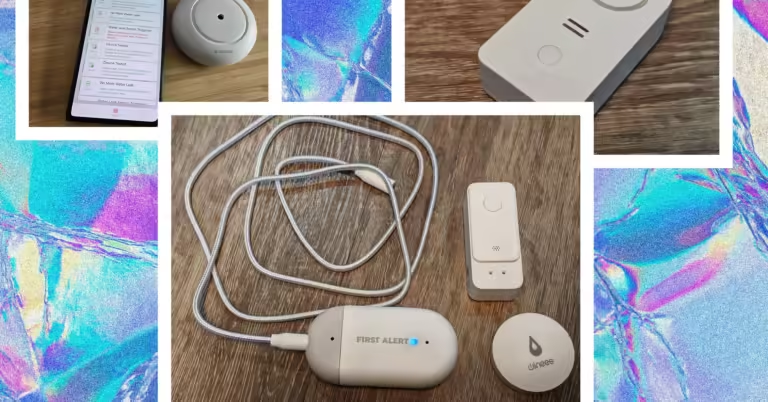Here are some things to consider when purchasing and installing a smart water leak detector in your home.
How does a water leak detector work?
Water leak detectors can detect puddles, but some can also detect dripping water or increased humidity. Premium water leak detectors monitor the flow of water in your pipes. All detectors connect to a hub or directly to your Wi-Fi network and send you alerts if they detect a problem.
What types of water leak detectors are there?
Water leak detectors can have a cable with a sensor on the end, a water sensing cord, or are self-contained with sensors on the top or bottom or both. Some detectors have the option for an extension node. At the higher end of the market, you can get water leak detectors that attach to your pipes and measure the water flow, automatically shutting off if a leak is detected.
How many water leak detectors do I need?
Unless you have only one problem area or piece of equipment you want to monitor, you’ll likely need more than one leak detector. When considering which type of detector is best and how many you need, think about the area you want to cover.
Where should I install my water leak detector?
They can be installed anywhere you are concerned about leaks, such as under sinks, behind toilets, beside washing machines, humidifiers, water heaters, or other water tanks. If you have problem areas that have had leaks before or are concerned about aging appliances, it may be a good idea to install a leak detector there.
How does a water leak detector give you an alert?
All of the smart leak detectors we tested send push notifications when there’s a leak, although some also send emails or texts. Most products have some sort of alarm sound built in, but some offer a separate siren or can be set to send alerts through a smart speaker or other device. It’s worth checking whether the product you choose supports disconnection alerts to warn you when you lose connection, which can happen when power or Wi-Fi goes out.
How is the water leak detector powered?
Most detectors are battery-powered, although some are designed to plug directly into an electrical outlet. Plug-in detectors are easy to set up and forget, but battery-powered detectors offer more flexibility in where you place them and usually come with an app that will alert you when the batteries need changing.
Does the water leak detector require a Wi-Fi connection?
Most smart leak detectors connect directly to your Wi-Fi router or hub, so make sure you have a good signal wherever you place them. Most of the devices we tested only connect to Wi-Fi in the 2.4 GHz band. Remember, you’ll need internet access to alert you to leaks and problems while you’re away. If the internet goes down, it will simply function as a local alarm.
Can I integrate my water leak detector with my smart home?
Companion apps and mobile notifications are common, but some detectors support smart home standards, allowing you to access the detector with your smart home app of choice and set triggers and automations – for example, you can set a water alarm to flash your smart lights, or select a temperature to turn on your heating or air conditioning.
Can a leak detector shut off the water?
Some higher-end systems can install water monitoring devices with automatic shutoffs that will shut off your water supply if a leak is detected, but these systems are typically expensive and may require professional installation.
Can water leak detectors also monitor temperature and humidity?
Some smart leak detectors can also monitor temperature and humidity, which can alert you to possible leaks nearby, such as frozen pipes or humid environments. Temperature and humidity typically change over time, so you’ll quickly spot any noticeable changes that need to be investigated. Smart home automation can also be used to run heating and fans at specific levels to reduce the risk of damage.

